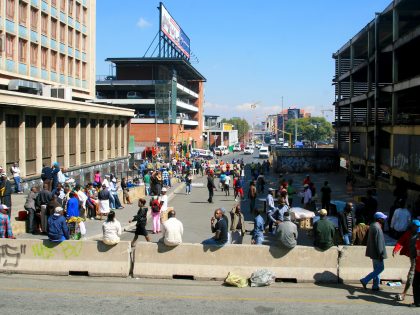
What needs to fall to what needs to rise
The video playlist from our one-day symposium marking the 10th anniversary of the Marikana massacre—funded by Rosa Luxemburg Stiftung—is now on YouTube.

The video playlist from our one-day symposium marking the 10th anniversary of the Marikana massacre—funded by Rosa Luxemburg Stiftung—is now on YouTube.

South African policing is a tool of social control and repression. Are democratic and humanistic alternatives possible? This week on the AIAC podcast, we discuss.

South African companies can afford to pay their workers a living wage—if not for their commitment to profit shifting, as the case of Lonmin and Marikana showed.

Why do representative bodies like the union, the party, and the so-called Left seem to fail its constituents during struggles like Marikana?

Accountability—insofar as it ever existed within the South African Police Service—has been reduced to a merely theoretical concept. It is time this changed.

In South Africa, the seismic shifts in unionism triggered by the Marikana Massacre have sadly not resulted in a union movement better equipped to tackle the issues that workers face.

The impact of the Marikana massacre on South Africa’s student movement for free education, and an end to outsourcing, has been overlooked.

We know an enormous amount about what precipitated the 2012 Marikana massacre, but relatively little about what is behind the violence there since.

The Marikana Massacre changed democratic South Africa forever. It can also catalyze resistance to the current order.

Platinum holds promise for a net-zero future. But the promise of platinum cannot be founded on the broken promises endured by those who live in its spaces of extraction.

If committed filmmakers want to reach and influence more people, and counter fake news, impact producing may help get us there.

Oupa Lehulere, revolutionary teacher and mentor, died on November 29. His approach to theoretical study and struggle was the same: there are no shortcuts.

We have to become more open to the possibility that what our society needs is not better policing, but less. And ultimately no policing at all.

Ordinary working-class people have been forced to the belief that there can never actually be real solutions; stripped of the confidence that fundamental change can happen.

South African politics urgently needs an injection of electoral energy from the left, that speaks in a language that resonates with voters, rejects chauvinism and embraces democracy.

South Africa's problems are no longer specific to the apartheid legacy, but about more global issues of poverty and inequality.

Marikana's workers were active agents in controlling their own destinies in the midst of plutocratic mine-owners and “pocket trade unions.”

The relationship between the massacre of workers at Marikana and the rational destiny of market fundamentalism.

The astonishing lengths to which the South African state went to demean and diminish Marikana miners, dead and living, and their loved ones.

When the widows of Marikana tried to wake up their husbands from their graves by yelling at them.